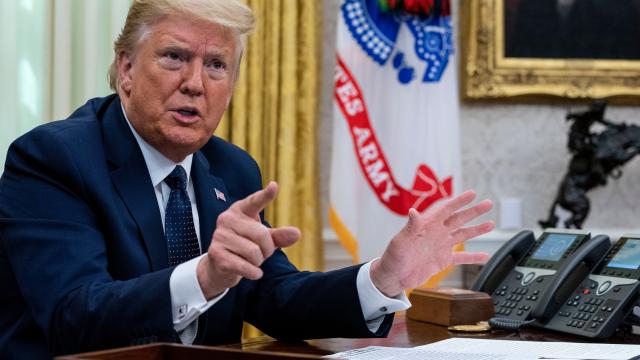Newly unsealed court filings following a federal indictment accusing Donald Trump of trying to overturn the 2020 elections show the lengths Twitter lawyers went to try and notify the former president of the government’s inquiry and delay investigators from obtaining detailed information from the former president’s account. The fillings also show the judge’s growing frustration with Twitter’s sidestepping legal team, which was ultimately held in contempt and fined $US350,000.
“I was getting nickel and dimed for the prior 20 minutes of conversation,” US government attorney Thomas Windom told the judge on February 9 when asked about his laborious communication with Twitter lawyers.
The newly unsealed court transcripts document Twitter’s repeated delays in handing over data related to Trump’s Twitter account as part of a Special Counsel warrant. That warrant was expansive and included a request for Twitter to hand over Trump DMs, both written and drafted, drafted tweets, a list of other accounts associated with him, and even his location data. US District Judge Beryl Howell grew frustrated with Twitter’s apparent hand-wringing over certain data, and repeatedly asked why the company was appearing to provide Trump special products other users didn’t have.
“Is it because the new CEO wants to cozy up with the former president?” Howell asked Twitter’s legal team in a hearing dated February 7, four months after Elon Musk took over the helm at Twitter and less than three months after the company reinstated Trump’s account at Musk’s request.
“Is this to make Donald Trump feel like he is a particularly welcomed, renewed user of Twitter?” Howell later asked. George Varghese, an attorney representing Twitter, pushed back against that question and said Twitter was simply exercising its constitutional rights. Twitter did not immediately respond to Gizmodo’s request for comment.
Twitter’s legal team repeatedly clashed with prosecutors over the government’s insistence that the social media company agree to a “nondisclosure” order that would forbid notifying Trump about the warrant and the data being requested. Prosecutors warned that advanced warning could impact their investigation without providing specifics. At times, Twitter expressed concerns that some of the data it was handing over about Trump could be protected under executive privilege, which both the judge and prosecutors seemed to believe was far-fetched.
Howell’s frustration with Twitter’s legal team at times reads like a comedy. During a hearing dated February 9, the judge asked Twitter lawyer Ari Holtzblatt if he understood the full scope of the information listed in the warrant only to abruptly cut him off.
“We’re just going to go through it [the warrant] line by line, something tediously—I tried to avoid at the last hearing; but it seems like that kind of supervision of Twitter is necessary here,” Howell said.
Later, Howell seems to take pleasure when one of Twitter’s other lawyers, appeared to the hearing late and was locked outside the courtroom door. When a lawyer for the government asked if he should wait to continue speaking, the judge didn’t mince words.
“Proceed,” Howell said. “In my chambers, we wait for no man.”
Advocates take issue with broad nondisclosure orders
While the court documents paint a picture of Twitter’s lawyers attempting to take “extraordinary” efforts to notify Trump of the warrant, ACLU Speech, Privacy and Technology Director Ben Wizner told Gizmodo that “advance notice” is precisely what they and other speech organizations have advocated social media companies pursue for other users in the past. Companies like Twitter, Wizner noted, receive thousands of government requests for user data every year, making it virtually impossible for them to challenge every case. Instead, giving users notice of the request gives them the opportunity to go to court and potentially try to narrow an overly broad request.
“It’s the former president, so it’s an unusual situation, but in the ordinary course, we can’t expect Twitter to hire a fancy law firm to go in and negotiate these orders on behalf of all of its users. Wizner said. “The evidence is not going to be spoiled, it’s still held by the social media company and they will still comply with the ultimate decision of the court.”
In this case, Twitter ultimately did fail to comply with a court’s ruling, which led to its $US350,00 fine, something Wizner said the ACLU does not condone. There are also some scenarios where notifying a user could harm an investigation but Wizner said it remains unclear if that was actually the case for Trump.
“The burden should be on the government to justify why that notice has to be delayed,” Wizner added. “We are not advocating that social media companies ignore the clear orders of judges, we have long advocated that they request permission to notify their users.”
Still, Twitter’s interest in pushing back against the government in the Trump case runs contrary to a larger trend to the company cow tailing to government data requests. Despite Musk pledging to make Twitter a bastion for free speech absolutism, the company has actually complied with more government data requests for user data than it did prior to his tenure. In the six months after taking over Twitter, according to Twitter data provided to the Lumen database, the company received a total of 971 requests from governments and courts and complied with 808, or around 80% of them. The company only complied with around 50% of requests prior to Musk.
